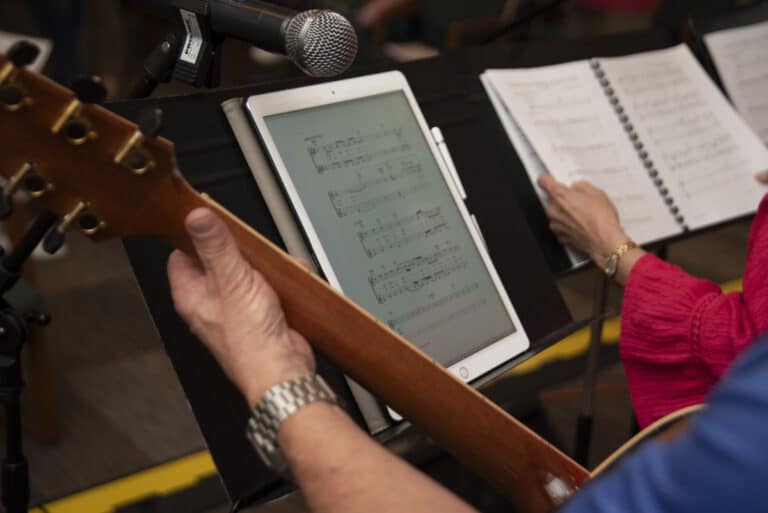Our reflections on the psalms are influenced by so many factors, whether a psalm in ordinary time or the Advent psalms. When thinking about the psalms as songs, we hear our favorite setting. As singers and musicians, we may remember a special occasion when we led the assembly. As fellow Christians on the journey, we may be comforted or challenged by a certain psalm or connect with one because it was sung at a special time in our lives, like a wedding or funeral. Perhaps the psalm simply rises up from deep within us when we have no other words to pray.
As musicians we have personal attachments to the psalter that are deeper than other parts of the Scriptures. These songs were composed and sung through the centuries by folks like us. We relate to them.
In taking time to pray with the Advent psalms this year, I’d like to add some Scriptural context to this kaleidoscope of influences. I am working with the psalms as prescribed in the lectionary cycle and how they are found in the bible. This may vary slightly from some sung versions you know and love.
The psalms given for weeks one (25), two (126) and four (80) are all lament psalms. This may be surprising when we first look at the words we are singing. The responses given are not overtly sad, and this is Advent not Lent.
Advent Psalms Week One – Psalm 25
Psalm 25 is an old one. It is listed as “of David.” We remember that David, though a great sinner, also was a great repenter. His love of the Lord, despite his sins, is evident in his story and in his music. If we pray the entire psalm, we hear him beseeching God for forgiveness. This is the context for our response, “To you, O Lord, I lift my soul.” We hear of the love and faithfulness of God. This is who God is. Good and upright. Teaching the humble. Verse 6, which we do not sing but follows the first stanza is “Remember, your compassion and love, O Lord; for they are ages old.”
As we begin this time of Advent, we too stand in need of prayer. We know our faults, failings, and sins. Yet, we are confident of God’s tender care. Are we honest with God, who knows us well and loves us? Do we lay ourselves open and bare before God in confident love? Do we fundamentally trust God’s love for us and our relationship with the Lord? In the midst of the chaos of our lives and world, are we willing to do as the gospel says, “… stand erect and raise your heads”?
Advent Psalms Week Two – Psalm 126
It may sound odd to classify Psalm 126 as a lament. “The Lord has done great things for us; we are filled with joy.” Joy comes in many forms. We may think of inexpressible happiness. That is one way of considering it. In what context do we feel joy? In the case of this psalm, it was “When the Lord brought back the captives of Zion.”
In 586 BCE the Babylonians captured the Kingdom of Judah, destroyed the Temple, and carried away into the Exile many of the people. It was over. The land promised to Abraham and his descendants forever was no longer theirs. Yet in about 540 BCE Cyrus of Persia conquered Babylon and amazingly sent the people back home. In addition, unbelievable as it sounds, he also sent supplies and workers to help them rebuild the Temple. How could one not be filled with joy? Yes, “When the Lord restored the fortunes of Zion, then we thought we were dreaming.” (Psalm 126:1)
This joy is the joy after hardship. It is the joy whose foundation is trust in the midst of pain. It is the joy when God makes a way out of no way. It is the joy of hope. It is the joy of miracles; what God alone could do.
In the last stanza we sing of the people’s renewed participation in the new world that God had given them. God gave them back the Promised Land. They carried the seed to begin again. There is work yet to be done. Work united with God for the world.
The first reading on this Sunday speaks of these same events. The gospel is Luke’s version of the prelude to Jesus’ ministry: the preaching of John the Baptist. A new way is coming.
Where are we this Advent as we hear and sing these Scriptures? Do we feel the pain of exile or detachment from what we hold dear? Are we already rejoicing in a new world God will provide? Or are we sitting in hope?
Advent Psalms Week Three – Canticle: Isaiah 12
Gaudete! In the middle of the laments come more shouts of joy. Again, it is joy because of trust in the Lord in the midst of difficult times.
First Isaiah preaches in Judah, the Southern Kingdom in roughly 700 BCE. Recall that following the reign of Solomon, the Kingdom was divided into Israel in the north and Judah in the south. In 721 BCE, the Assyrians conquered Israel and were on their way to Judah. However, other issues prevented them from finishing the conquest. (Note that the book of Isaiah is the work of three different prophets from three different time periods edited into one.)
Isaiah preaches to a people that are afraid, yet resistant to changing their ways and turning from their sins. They have seen what happened to Israel, but they remain stubborn and in need of conversion.
How often do we follow the same pattern? We rejoice when we feel God is near, but then return to patterns of behavior that push the Lord away. As the chords of this canticle die away, our gospel for today challenges us. Rejoicing is important and righteous, but it must be paired with lives of justice. Luke is clear that Jesus’ mission is one of the Holy Spirit and fire. It is where the mighty are cast down and the lowly are raised up. It is in this vision of the world we rejoice. This is the God we praise and thank.
On which road is our Advent journey? One of constant parties? Or one that includes our poor, those excluded, all in need? Do we embrace God’s reign and vision?
Advent Psalms Week Four – Psalm 80
Since the psalms do not give us a copyright date, scholars look for internal clues to discern when they were written or for what particular context. Psalm 80 is set during a time of defeat, though we are not certain exactly which defeat and who the conqueror might be.
Does it really matter? If we look at the verses not in the lectionary, we can feel the emptiness of devastation. “You have fed them (your people) the bread of tears, made them drink tears in great measure. You have left us to be fought over by our neighbors; our enemies deride us.” (Psalm 80: 6-7) This is the pain of emptiness and loss.
In the Scriptures, the struggle during the time of the monarchy was the power and egoism of the king versus God as king. The rulers are judged to be good or bad by the standard of the Sinai Covenant, not by riches or military might. Unfortunately, the people too left behind the covenant promise to “Be God’s people.” They worshiped other gods, even in addition to YHWH. They cheated the poor. They relied on themselves. When the community wandered far from the Lord, they reaped what they sowed. They were conquered. This is the context for the psalm.
When our assembly sings, “Lord, make us turn to you; let us see your face and we shall be saved,” we cry out for conversion. We seek a transformation beyond even what we can imagine. Our egos, our selfishness, our sinful ways have been our downfall. In trust we call on God to force a fundamental change in our hearts. We want it, but we cannot do it on our own.
What ushers in the change? In the psalms the people long for God to keep the promise made to David. They want a king with a heart for God. As we pray on this Fourth Sunday of Advent, we know God’s plan was even bigger than what the people could dream. God, Godself, would come into the world. Jesus came.
As we stand on the threshold of celebrating the Incarnation, do we want God to change us? To make us (re)turn to the Lord? It will be more than we can imagine. It may be scary. It is a way beyond our world’s values. We must not approach Christmas with a divided heart, still secretly hoping to return to our old way of living, trusting other gods.
With inexpressible joy, born of struggle and change, we beg God to transform us and our world. We trust in a new way, that we do not fully understand. May our Advent and reflecting on these Advent psalms prepare us to joyfully and triumphantly sing that Christ is come.
Written by Mary Dumm, D.Min, who is a founding board member of CLEF and the pastoral associate at St. Blase Church in Sterling Heights, Michigan. Additionally, she teaches at Siena Heights University and SS. Cyril and Methodius Seminary.
Copyright © 2024 Catholic Liturgical Ensemble Formation
Looking for more resources? Search our full online library of CLEF Life resources, or sign up for CLEF Life email updates to receive the latest resource in your inbox once a week.



